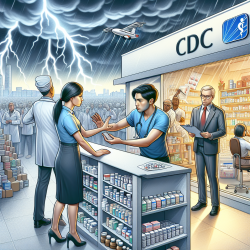Introduction
Pharmacists have long been recognized for their vital role in healthcare, but their contributions in public health emergencies are often underappreciated. A recent study titled "Roles and contributions of pharmacists in regulatory affairs at the Centers for Disease Control and Prevention for public health emergency preparedness and response" highlights the indispensable role pharmacists play in emergency preparedness and response. This blog will explore key findings from the study and offer practical insights for practitioners looking to enhance their skills and contribute more effectively in emergency situations.
The Critical Role of Pharmacists in Emergency Preparedness
The study outlines the contributions of pharmacists within the Regulatory Affairs (RA) program at the Centers for Disease Control and Prevention (CDC). These pharmacists are instrumental in ensuring the availability and regulatory compliance of medical countermeasures essential for public health emergencies, such as the 2009 H1N1 pandemic.
Pharmacists in the RA program are responsible for:
- Submitting Emergency Use Authorization (EUA) requests to the Food and Drug Administration (FDA).
- Developing protocols and applications for investigational medical countermeasures.
- Providing regulatory expertise and guidance for the use of medical products.
Practical Insights for Practitioners
For pharmacists and other healthcare practitioners interested in enhancing their skills in emergency preparedness, the study offers several practical recommendations:
- Engage in Further Education: Consider enrolling in graduate programs focusing on regulatory affairs to deepen your understanding of regulatory compliance and emergency response.
- Stay Informed: Regularly visit resources like CDC's Emergency Preparedness and Response website to stay updated on best practices and emerging threats.
- Collaborate with Experts: Work closely with regulatory affairs specialists and subject matter experts to gain insights into the regulatory processes involved in emergency preparedness.
Implementing Research Outcomes
By applying the insights from this study, pharmacists can significantly enhance their contributions to public health emergency preparedness. Here are some actionable steps:
- Develop Protocols: Participate in the development of protocols for the use of medical countermeasures during emergencies.
- Educate Peers and the Public: Use your expertise to educate healthcare providers and the public about the legal and regulatory aspects of medical countermeasures.
- Monitor and Evaluate: Continuously monitor the effectiveness of implemented strategies and make necessary adjustments to improve outcomes.
Conclusion
The role of pharmacists in public health emergencies is crucial for ensuring the availability and regulatory compliance of medical countermeasures. By implementing the research outcomes and engaging in further education, pharmacists can enhance their skills and contribute to better outcomes in emergency situations.
To read the original research paper, please follow this link: Roles and contributions of pharmacists in regulatory affairs at the Centers for Disease Control and Prevention for public health emergency preparedness and response.










